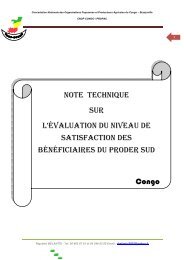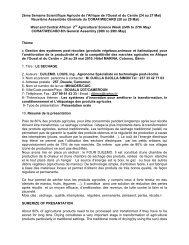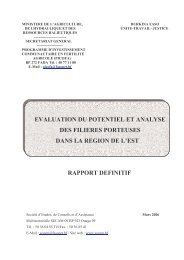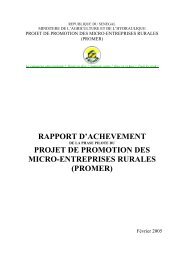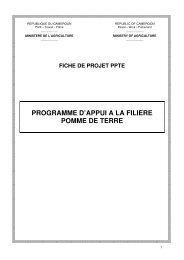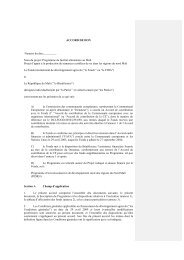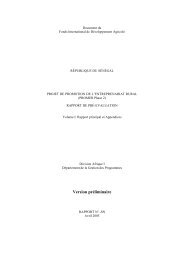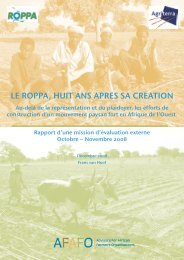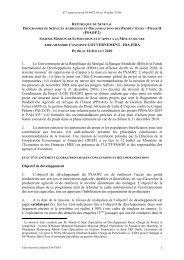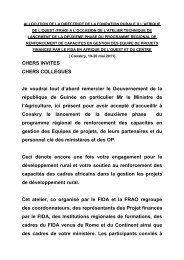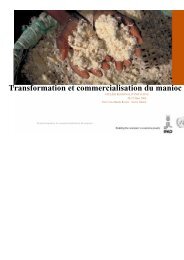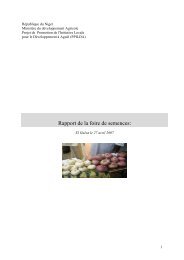Scaling Up the Fight Against Rural Poverty - FIDAfrique
Scaling Up the Fight Against Rural Poverty - FIDAfrique
Scaling Up the Fight Against Rural Poverty - FIDAfrique
You also want an ePaper? Increase the reach of your titles
YUMPU automatically turns print PDFs into web optimized ePapers that Google loves.
facilitate key aspects of scaling up, including policy dialogue, knowledge management, partnership<br />
development, and stakeholder engagement.<br />
Despite <strong>the</strong>se organizational and functional changes <strong>the</strong>re remain a number of issues relevant for<br />
IFAD’s ability to support scaling up of rural poverty interventions:<br />
Role, capacity and incentives of <strong>the</strong> CPM: The CPM is <strong>the</strong> most important player for IFAD in its<br />
operational work on <strong>the</strong> ground. One of <strong>the</strong> key conclusions from our interviews is that CPMs face<br />
major challenges in delivering on <strong>the</strong> many competing tasks that <strong>the</strong>y are charged with. “CPM<br />
overload” is a term frequently heard. Although CPM jobs are highly prized among IFAD staff for <strong>the</strong>ir<br />
independence, empowerment and scope for development impact on <strong>the</strong> ground, <strong>the</strong>y risk being a<br />
bottleneck in IFAD’s efforts to become an institution that effectively delivers on <strong>the</strong> scaling up<br />
agenda. Currently, <strong>the</strong> CPM’s overarching incentive is to deliver a steady supply of projects for<br />
management and Board approval – projects that meet many expectations, including and especially <strong>the</strong><br />
innovation objective, which in recent years has been an overriding concern for IFAD. O<strong>the</strong>r objectives,<br />
such as analytical work, knowledge management, policy dialogue, partnership development and<br />
scaling up have been at best secondary objectives. IFAD’s increased field presence and with it <strong>the</strong><br />
employment of local country office staff has helped lighten <strong>the</strong> CPMs’ burden, but <strong>the</strong>y remain<br />
overloaded by all accounts. Some regional divisions are experimenting with alternative approaches to<br />
streng<strong>the</strong>n <strong>the</strong> capacity of CPMs (including adding Assistant CPMs and Country Officers). Finding<br />
ways to free up more of CPMs’ time and providing <strong>the</strong>m with incentives to focus on key strategic<br />
issues, especially <strong>the</strong> pursuit of a suitable scaling up pathway in <strong>the</strong>ir countries, will be a key<br />
managerial challenge for IFAD.<br />
Engagement of technical staff: Based on our interviews, IFAD managers are concerned about a<br />
number of issues with regard to its technical staffing. These issues tend to limit <strong>the</strong> institutional focus<br />
on development effectiveness, on learning and knowledge sharing, and ultimately on scaling up:<br />
• Many of IFAD’s technical staff are on 1-3 year contracts, often hired under special programs<br />
with coterminous contracts.<br />
• Much of <strong>the</strong> technical project preparation and supervision work is farmed out to outside<br />
contractors. A high fraction of IFAD’s manpower budget is devoted to consultants.<br />
• IFAD’s in-country project coordinators are frequently hired away by IFAD’s partners.<br />
• There is little staff rotation of staff across regional divisions.<br />
There are benefits from maintaining <strong>the</strong> status quo, but <strong>the</strong>se need to be weighed against <strong>the</strong> need to<br />
create a staff capacity within IFAD to ensure much increased attention to <strong>the</strong> corporate goal of scaling<br />
up, which requires that IFAD’s staff have a longer-term perspective, and see value to <strong>the</strong>mselves from<br />
investing in knowledge sharing, partnership building and scaling up.<br />
Staff development and training: Rewarding, counseling and training staff for meeting <strong>the</strong> scaling up<br />
challenge is a critical component of influencing staff behavior. During annual performance reviews<br />
managers need to focus on <strong>the</strong> readiness and ability of staff to create and pursue scaling up<br />
opportunities strategically in country programs. Senior staff, both managerial and technical, should<br />
counsel <strong>the</strong>ir colleagues on an ongoing basis how to do this. Training and learning programs, based on<br />
solid analytical evidence, need to be developed to help staff and managers develop <strong>the</strong> capacity to<br />
deliver on <strong>the</strong> scaling up mandate.<br />
2. Financial resource allocation<br />
The rules and practices for <strong>the</strong> allocation of IFAD’s financial resources can have important impacts on<br />
<strong>the</strong> way <strong>the</strong> institution’s scaling up agenda is realized. Two types of financial resources are relevant:<br />
first, IFAD’s loan resources, and second, IFAD’s administrative budget resources. We already<br />
explored <strong>the</strong> use of grants for scaling up in <strong>the</strong> preceding chapter.<br />
44



